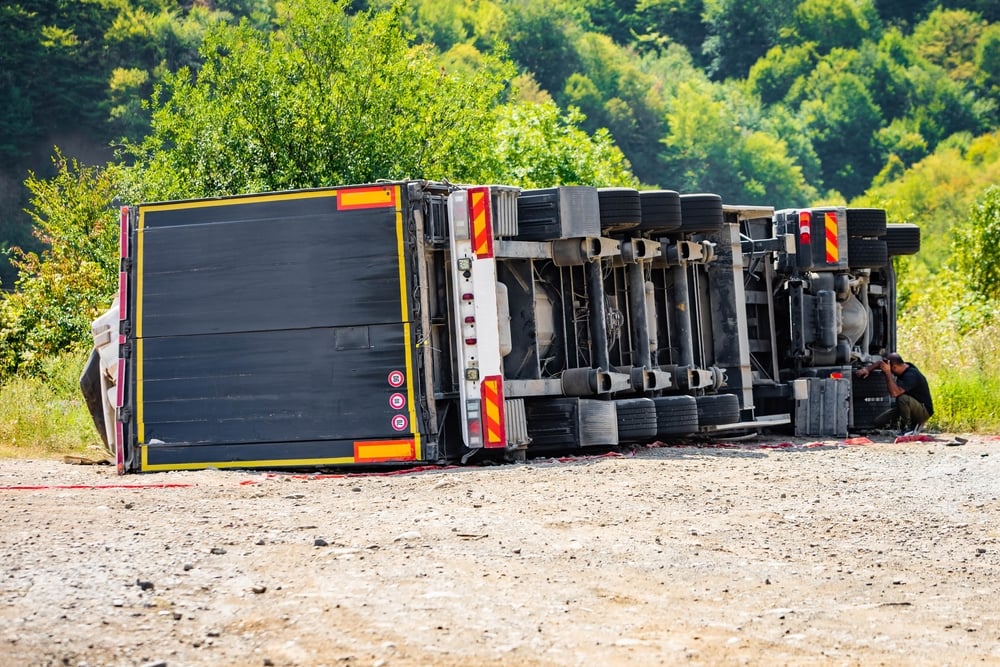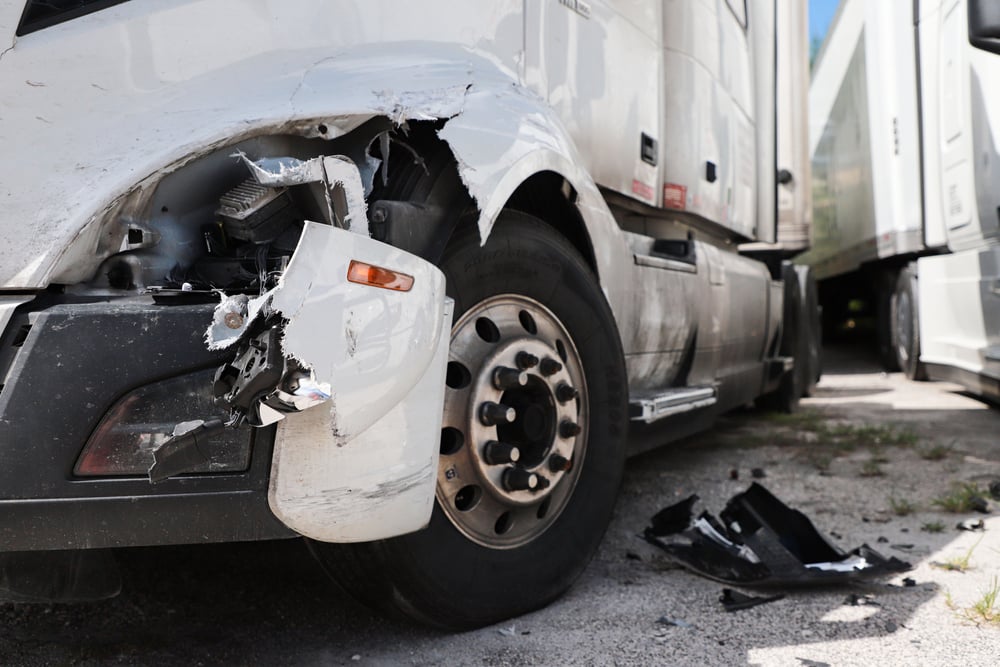Thousands of commercial delivery trucks, moving vans, and big rigs move on Buffalo’s roads every day due to its proximity to the Canadian border. Many of these trucks travel through Buffalo en route to their final destinations across the East Coast. From I-90 spanning across the city to the Peace Bridge connecting to Canada, these vehicles often congest the highways in the area. Unfortunately, they also contribute to numerous catastrophic accidents every year.
There were 6,876 commercial truck crashes in New York in 2023 with 116 fatalities. These include innocent car drivers, motorcycle riders, bicyclists, and pedestrians, among others. If you or a loved one have survived being hit by a truck, you are likely facing a lasting impact on your health and ability to work. Research shows that 50% of head injuries sustained in these accidents result in long-term physical or cognitive disabilities to some degree.
At Mazzu Law, we have over a decade of experience handling accident claims involving all kinds of trucks-garbage trucks, semi-trailers (18-wheelers), box trucks, flatbed trucks, tow trucks, concrete mixers, and delivery vans. Our truck accident law firm in Buffalo, NY, is here to negotiate with the insurance companies on your behalf so you can focus on your treatment. Contact us online or call 888.289.5000 for a free case review.

Trucking Accident Laws in Buffalo, New York
As truck collisions are among the deadliest traffic accidents, commercial truck drivers are held to stringent driving regulations at both the federal and state levels. Our Buffalo truck accident lawyers at Mazzu Law are well-versed in these laws and will use them to your advantage.
The FMCSA’s Hours of Service (HOS) Regulations
The Federal Motor Carrier Safety Administration (FMCSA) limits the number of hours a truck driver can operate in a day and a week to prevent fatigue. For example, they are allowed a maximum of 11 hours of driving within a 14-hour window after being off duty for 10 consecutive hours. Drivers must take a 30-minute break after eight hours of driving, and must not drive more than 60 hours on duty over seven consecutive days or 70 hours over eight days. These hours should be electronically tracked to ensure compliance.
Commercial Driver’s License (CDL) Requirements
Drivers must have a CDL, obtained through proper training on the handling of heavy vehicles. There are different classes of CDLs depending on the type of vehicle operated:
- Class A for any combination of vehicles with a gross combination weight rating (GCWR) of 26,001 pounds or more
- Class B for a single vehicle with a GCWR of 26,001 pounds or more
- Class C for vehicles designed to transport 16 or more passengers (including the driver) or transporting hazardous materials
Drug and Alcohol Testing
Each driver must undergo mandatory drug testing before employment and random testing on an annual basis to ensure they are not impaired while driving. In case an accident occurs and there is a fatality or the driver receives a citation for a moving violation, they need to undergo post-accident testing as well.
Vehicle Maintenance Standards
Trucks must be regularly inspected, maintained, and repaired to meet safety standards. Records of these daily and yearly inspections must be kept for each vehicle in case an audit is required by regulatory bodies. If any preventive or corrective maintenance is performed on a truck, it must be specified in the documents.
Load Regulations
There are federal guidelines on how cargo must be secured and how much weight a truck can legally carry, which helps prevent accidents caused by shifting or lost cargo. Typically, the maximum allowable weight for a commercial truck is up to 80,000 pounds without a special permit.
Common Truck Accident Injuries in Buffalo, NY
A fully loaded cargo truck can weigh up to 80,000 pounds, while a garbage truck may weigh anywhere around 51,000 pounds. Even when empty, these vehicles weigh at least 20,000 to 32,000 pounds. In contrast, a large, full-size SUV weighs a mere 5,000 or 7,000 pounds, and compact passenger vehicles are barely 3,000 pounds.
The mass of a truck means more force during impact, which causes monumental damage upon colliding with a smaller vehicle. As a result, the following serious injuries are frequent among truck accident victims:
- Whiplash
- Concussions
- Traumatic brain injury
- Broken ribs
- Spinal cord injuries
- Internal bleeding
- Puncture wounds
- Amputations
- Friction burns
- Disfigurement and scarring
The recovery from these severe injuries is longer and more complicated compared to accidents involving only motorcycles or passenger cars. Always seek immediate medical attention after such accidents, even if you feel okay, as some injuries do not show symptoms right away.
At Mazzu Law, a truck accident lawyer can calculate not only your currently due hospital bills but also estimate the care you may need in the future for your complete compensation package. We work with top medical professionals in New York to understand all your care-related requirements-surgeries, physical therapy, long-term care, medications, medical devices, and any necessary modifications to your home.
Who Is Liable for Your Truck Accident Injuries in Buffalo, NY?
Since a commercial vehicle has a lot of moving parts, in terms of how it is operated, multiple parties could be held responsible for your damages:
- The driver of the truck
- The trucking company that hired the truck driver (via direct negligence, poor supervision, or “vicarious liability“)
- The truck owner (if different from the trucking company)
- Cargo loaders
- Maintenance companies
- Parts manufacturers
- Government organizations (local or state) responsible for road safety
- Other drivers
You will possibly have to communicate with more than one insurance company-your own and the trucking company’s insurers. New York operates under a “no-fault” insurance system for immediate medical bills and lost earnings, so your own car insurance may cover these initial costs, regardless of who was at fault. However, for catastrophic injuries, an experienced truck accident lawyer can help you bring a personal injury lawsuit to pursue additional compensation, including:
- Pain and suffering
- Emotional distress
- Loss of consortium
- Future medical expenses
- Future lost wages and earning capacity
- Loss of enjoyment of life
- Rehabilitation costs
- Property damage
- Punitive damages

Types of Negligence in Buffalo Truck Accident Cases
Most truck collisions come down to negligence, either by the truck driver or their employer. At Mazzu Law, identifying this negligence-and who is responsible for it-is one of our first steps in establishing liability and maximizing the value of your truck accident claim.
Negligence by the Truck Driver
- Speeding
- Distracted driving
- Fatigue
- Driving under the influence of alcohol or drugs
- Ignoring traffic signs
- Failing to signal or check mirrors before changing lanes
- Tailgating or not leaving sufficient stopping distance
- Choosing routes that are unsafe or not allowed for trucks
- Failing to perform pre-trip and post-trip inspections as required
- Not locking cargo properly or overloading the truck
- Driving recklessly in rain, snow, or fog without adjusting speed or tactics
- Making illegal turns or maneuvers that are risky in a large truck
Negligence by the Trucking Company
- Not providing proper training for driving a large truck or handling special cargo
- Neglecting to check a driver’s driving record or criminal background before hiring
- Ignoring regular maintenance checks on vehicles
- Pressuring drivers to exceed HOS regulations to meet deadlines
- Lack of safety programs that comply with industry standards
- Assigning trucks that are not suitable for the job or driver experience level
- Not monitoring driver behavior or compliance with trucking regulations
- Not investigating trucking accidents to make improvements
- Not carrying sufficient insurance coverage for the hauling operations
- Not supervising or correctly training on how cargo should be loaded
- Ignoring medical examinations for drivers
- Employing truck drivers who do not have the appropriate licenses or endorsements
- Cutting corners on safety equipment in the trucks
- Failing to adhere to local, state, or federal regulations governing truck operations, safety standards, and employment practices
How Our Buffalo Truck Accident Attorneys Can Help
With so many defendants involved, determining fault in truck accidents is not easy unless you are working with an experienced Buffalo truck accident lawyer who knows how to investigate your case to uncover the root cause of the crash. Remember, by going against a trucking company, you are essentially taking on a corporation that employs a team of attorneys whose singular goal is to get your personal injury claim denied or diminished.
It falls on you to present evidence to support your claim. To meet this burden of proof, our legal team must establish the following regardless of whether we are suing a driver or a company:
- The at-fault party owed you a duty of care (e.g., all drivers have a duty to operate their vehicles safely and abide by traffic laws).
- They breached this duty (through actions like speeding, failing to secure cargo properly, driving under the influence, violating hours-of-service regulations, etc.)
- This directly caused the accident and your injuries.
- And you suffered actual, financial damages as a result.
To establish a clear link between the breach of duty and your injuries, and prove liability, our attorneys will collect the following evidence:
Accident Scene Data
Photographs of the accident scene, including skid marks, vehicle positions, debris, damage to the vehicles and surrounding area, and any relevant road signs or signals. Videos from nearby security cameras, dashcams, or eyewitness recordings are also crucial. We also measure the distances between key points, and the final resting positions of vehicles to help in reconstructing the accident.
Vehicle Data
Most commercial trucks today are equipped with Event Data Recorders (EDRs), or “black boxes,” that record information about speed, brake application, and steering angles before a collision. This may be pivotal in understanding the truck’s actions just before the accident. We will also request the truck’s maintenance history to check for any neglect in keeping the vehicle in proper working order.
Driver Information
The driver’s logbooks, which are required by federal law, can help verify hours-of-service compliance and rest breaks. This can indicate if fatigue played a role due to HOS violations. Background checks, training records, and previous incident reports related to that driver are also helpful in demonstrating a pattern of negligence or lack of adequate training. We will also obtain their cellular phone records to check if they were texting or calling at the time.
Eyewitness Accounts
Witness statements from other drivers, pedestrians, and passengers can corroborate details about the accident’s occurrence or contradict statements from the truck driver. We bring in accident reconstruction experts, automotive experts, and human factors experts to provide a professional perspective on how the accident happened and who is at fault.
Medical Evidence
Beyond the documentation from first responders and emergency room records to establish the initial impact of the crash on your health, we also get professional assessments from your doctors, specialists, and therapists that outline your injuries, the treatment plan, and prognosis. This is to get an accurate picture of your future care needs.
Legal and Regulatory Research
We examine if the parties involved adhered to national and state trucking regulations regarding weight limits, equipment standards, and driver qualifications. Research into similar cases and past judgments helps us find legal precedents to strengthen your case.
Cargo and Loading Documentation
We can also gather the loading dock statements to verify whether the cargo was properly loaded and secured, which may have affected truck stability during driving. Information about the cargo’s weight, type, and handling requirements is key in assessing if inappropriate loading contributed to the accident.

Early Legal Representation Matters in Truck Accident Claims in Buffalo, NY
From the moment you are hit by a truck, numerous legal processes begin to unfold. In Buffalo, for example, you have a three-year statute of limitations for filing personal injury lawsuits. This might seem like a lot of time, but it passes quickly. Preparing a solid case for you requires us to issue subpoenas or court orders to compel the release of data from the truck’s Electronic Control Module (ECM) and surveillance footage before it is overwritten. This alone can take several months.
Before considering a lawsuit, there is often a lengthy process of negotiation with insurance companies. This can extend over many months or even years, as both sides present evidence and argue about the degree of fault and the extent of damages. The defendant is likely to draw this process out to try to pressure you into settling for less. Not to mention, it may take several months for you to fully realize how your injuries will affect your life, your ability to work, and your well-being in the long term. Accurate assessment of these impacts is crucial for claiming appropriate compensation.
Court schedules in Buffalo are notorious for being congested and may get postponed due to factors like availability of all parties involved, conflicts in scheduling, and procedural delays.
The more time we have to develop your case, the better we can strategize. Rushing into filing a lawsuit without a well-prepared case can lead to weaker legal arguments and, potentially, a less favorable outcome. If you delay in taking action, it may also give the defendants enough time to work on strategies to shift blame onto you. They might argue that your actions contributed to the crash or that you failed to mitigate damages post-accident, such as by delaying medical treatment.
Get an Experienced Buffalo Truck Accident Attorney on Your Side
If you have been injured or lost a loved one in a crash involving a large truck, you should know that trucking companies carry substantial insurance coverage due to the dangers their vehicles and operators pose to other drivers. At Mazzu Law, we have spent more than a decade fighting for the rights of injury victims in all types of truck collisions:
- Jackknife accidents
- Rollover accidents
- Underride accidents
- Rear-end collisions
- Blind spot accidents
- Head-on collisions
- Side impact collisions
- Tire blowout accidents
- Wide turn accidents
If you are looking for a personal injury lawyer in Buffalo experienced in motor vehicle accidents, construction accidents, workplace injuries, or dog bites who can take on large insurance carriers and powerful trucking companies, send us a message or call our office in Buffalo at 888.289.5000 to schedule a free consultation.